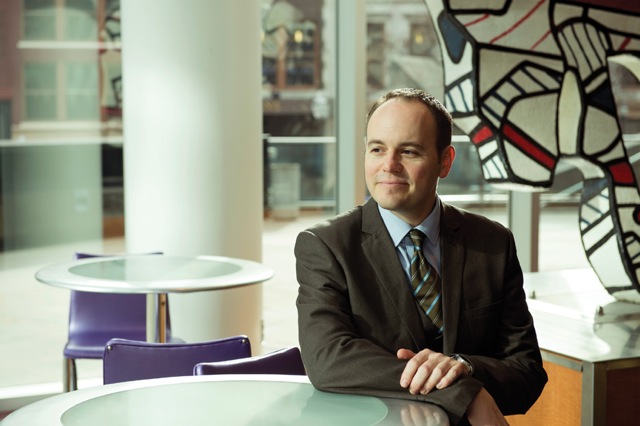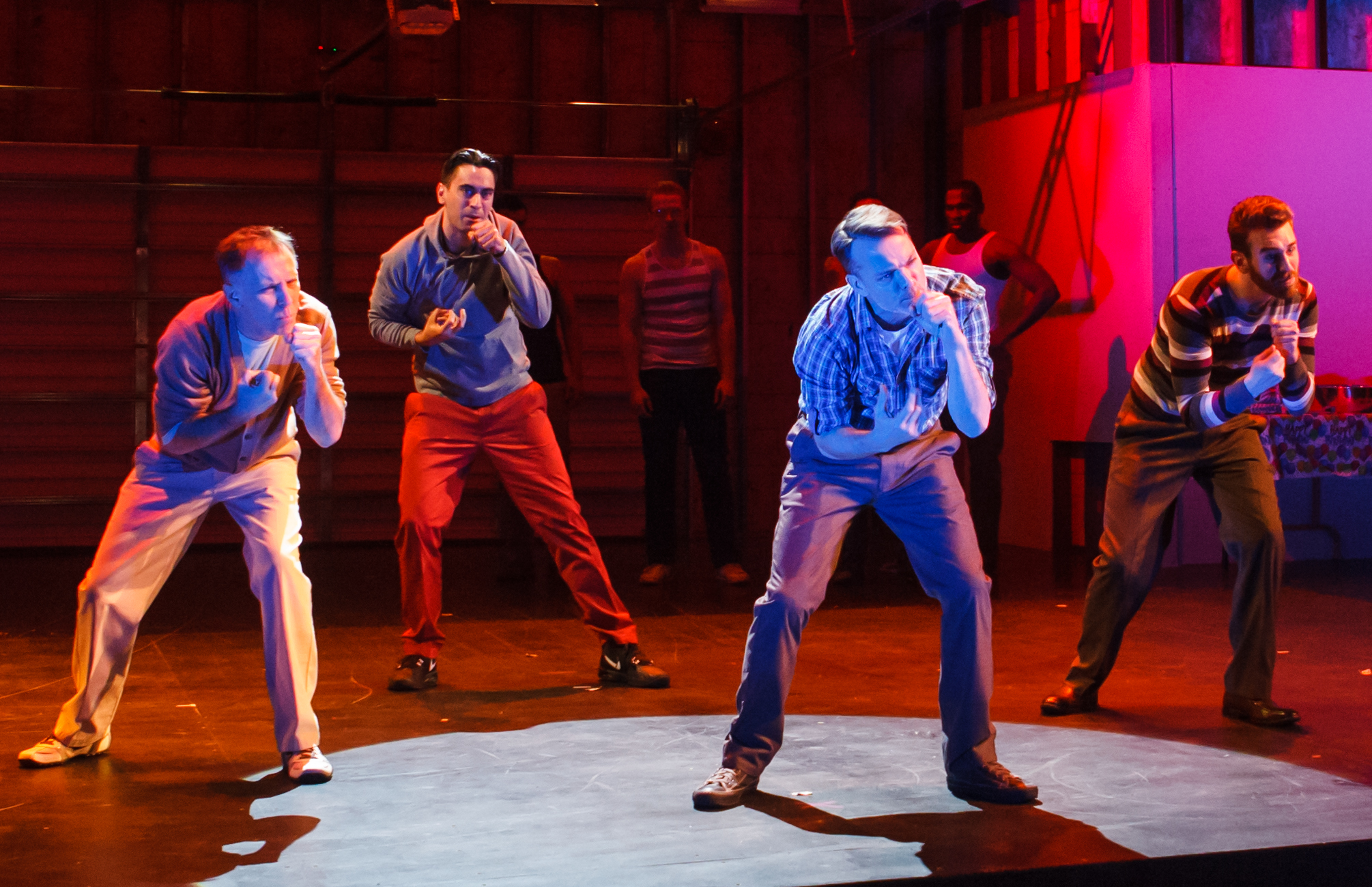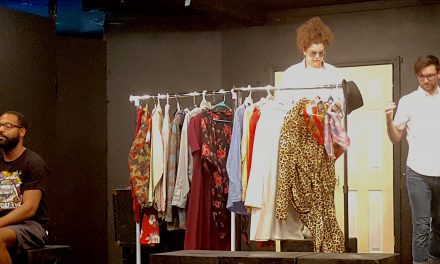Andrew Kipe. Photo by Sam English.
Andrew Kipe, Executive Director of the Louisville Orchestra
Interview by Scott Dowd.
Entire contents © 2016 Fearless Designs, Inc. All rights reserved.
After nearly closing its doors for good in 2013, the Louisville Orchestra is back! Not only back—it is cool. And in the words of music director Teddy Abrams, it is “The Most Interesting Orchestra in the World.” The last time I met Executive Director Andrew Kipe, he was newly arrived in Derby City. He was still working to get his bearings and identify the current and potential players in the process of restoring Louisville Orchestra. Two years later, he has a firm grasp of the future and appears confident that the organization is headed in the right direction.
Scott Dowd: The last time we spoke, you were new to Louisville and still getting to know the community. Two and a half years later, do you feel like you have your arms around it?
Andrew Kipe: I think so—though every time I get my arms around it, it seems to get a little bigger. But I think it is helpful every now and again for us to take a minute to stop and realize what we have done in the past two years. It has been a lot of work, but it has also been a lot of fun. We are all really encouraged by the successes we have had and the reaction we have gotten from the community.
SD: What, to your mind, are some of the things that stand out most prominently?
AK: There have been some exciting tent pole events: A new concert series brought a batch of new audiences to hear the Orchestra; we saw some significant changes in the demographics of those audiences; Fourth of July was a big deal; and then, of course, opening the season with the Bernstein Mass was another really big deal.
SD: Why was the Fourth of July a big deal from the Orchestra’s perspective?
AK: My first summer here, 2014, was the year state funding was cut from Waterfront Park, which meant no fireworks. That didn’t seem right, so I talked to Teddy Abrams and said, “I think there is an opportunity here. Every major city has a Fourth of July concert with their orchestra at whatever iconic location they have—and they have fireworks! I think it’s something we have to do.” We had also been looking for some kind of presence at that time of year, so we began a dialog and got an initial commitment from Thornton’s to be the title sponsor of the event. Then we went to Waterfront Park.
SD: I bet they were surprised.
AK: Yes, we actually got the money first and then went to them and said, “Hey guys! How about we do a concert on the Fourth of July?” They jumped right on board and it was truly a joint production. Then, of course, Teddy put his unique spin on it. He said, “If we’re going to do it, it has to be meaningful to Louisville”—meaning that we weren’t just going to play Sousa marches and the 1812 Overture. His idea was to feature local artists, so we had local bands do a pre-show from five to eight. There was some Beethoven on there, and Teddy did one of his own pieces and had a set with Ben Sollee. He also did a rap set with Jecorey Arthur. And we still had the Sousa and 1812 Overture and all the other stuff!
SD: We all know how it turned out, but at the time were you concerned about the reception this program might receive?
AK: We really had no idea what to expect. We had never done that specific event on the Fourth of July; they had nothing the year before. I think we would have been happy if we had gotten ten thousand people to come out. Metro Police tells us we had thirty-five thousand! It was a gorgeous night and a huge success. I have done a lot of Fourth of July concerts—some of my orchestras did a whole series of them—but I have never seen what we had here last year! We must have had three hundred young people in their twenties down at the edge of the stage the whole time—like you see at a rock concert. It was an amazing interaction that you don’t expect at an orchestra concert!
SD: Not the kind of thing you expect, but neither is a rap set! Did you get much pushback from traditionalists?
AK: You know, we got no pushback from anybody. Everybody I spoke with agreed that it was a great concert.
SD: You have just completed two concerts that comprised the Festival of American Music. Tell me about that.
AK: This is something that Teddy would like to turn into an annual event. The Louisville Orchestra has such a long history of presenting new works, and Teddy feels very strongly about working with music of our time. We did not program all new music on those concerts. We had some Copland and other well-established composers, as well as new music. Teddy demonstrates in a lot of his programming the breadth and possibility in what is often termed “classical” music. He doesn’t really like that term, so let’s call it traditional orchestral music. He wants to show through his programming that new music doesn’t have to be scary or off-putting—that we should celebrate both new composers and music of our time. The festival ran two full weeks with Orchestra at the beginning and end. In between, we partnered with a bunch of other local groups to be part of the festival—The Kentucky Center for the Arts, Headliners, the Ogle Center—to demonstrate the broad opportunities in American music. In addition to orchestral music, there was jazz, hip hop, with some country and bluegrass in there as well. It was a way for the community to come together and celebrate in a focused way to show what we are doing and what other people in the community are doing. Teddy was out during that middle week partnering with some bands and doing the things he likes to do.
SD: He performs in a lot of different venues with many different styles of music.
AK: We joke that he really wants to be in a rock band. That’s a really unique aspect of Teddy. There are a handful of conductors who still perform, but I don’t know of anybody who is doing what he’s doing. He is genuinely integrated into the indie music tradition of this community.
SD: I like the line I’ve seen in your promos: The Most Interesting Orchestra in the World. I can see now how you came to that.
AK: Teddy said that a couple of times, and we just picked it up. As we’ve talked about our strategy and where this orchestra is headed, it’s what we want to be. There will always be larger orchestras with more resources. But we can be the most interesting in terms of our programming, our outreach and our commitment to the community that is happening in a way nobody else is doing. Last year our conductor was playing with a band at Forecastle! Having Teddy and the Orchestra perform in non-traditional venues, having programming on the main stage concert series that is unique on every single program, is definitely “interesting!”
SD: It is a continuation and expansion of Louisville Orchestra’s history. Back in the ’40s and ’50s when they were commissioning new works and becoming the first American orchestra to have its own recording label, they were very much on the cutting edge. It was weird and different and nobody else was doing it.
AK: What we are trying to do is to reclaim the past in a way that is relevant now and in the future. Not because of what we did in the past, but because it’s important work and important to the community. If you want to talk about recording specifically, I can tell you we are finalizing our plans for a new recording project.
SD: What will that include?
AK: It will be some of the things we’ve done this year as well as some new things. Orchestral recording is a little more complicated than it was back in the ’40s and ’50s—not to mention expensive—so we’re working through all that. Of course, how you distribute it is completely different.
SD: When will this be available?
AK: I think we will be ready to make an announcement in the fall about the next generation of Louisville’s recording legacy. The Louisville Concerto is one piece we have talked about putting on that disk. It is important for the Orchestra as well as the community. The Louisville Orchestra still sees it as a big part of their identity.
SD: Is it important for composers?
AK: I was just about to say that as the original recording project was important for music of the mid-twentieth century, this could be important as a legacy for this Orchestra in the future as well.
SD: Your partnership production with the Louisville Ballet was amazing. I see that you are planning to work with Kentucky Opera next season. Will Bluebeard’s Castle be a similar partnership arrangement?
AK: Not exactly. Unlike Petrouchka, Bluebeard’s Castle is a very small, one-act opera. It has two singers and runs about sixty-five minutes and the set requirements are minimal. The Opera is going to help us choose the singers. There aren’t a lot of singers who know Bluebeard’s Castle, and Teddy wants it done in Hungarian, so that makes it even harder.
SD: It is Bartók after all.
AK: Yes! A lot of orchestras are doing semi-stage opera now. Cleveland does it a couple times a year. That is probably because the conductor, Franz Welser-Möst, is also general music director of the Vienna State Opera. Be that as it may, this could be a regular, ongoing thing for Louisville Orchestra as we attempt more complex works. I can see a day where we would do a fully integrated piece with Kentucky Opera.
SD: I certainly agree with you that it is good to bring vocal music into the mix. And when you want to do a big piece like the Bernstein Mass, it becomes another form of community outreach.
AK: Audiences love it.
SD: I heard something about another partnership you have planned for next year with the Speed Museum.
AK: For the last several years, the Speed Concert Series has made one of their offerings a silent movie that is paired with live music. Teddy did Nosferatu last year. We asked if there was potential for a future collaborative effort, so next season there will be a full-length movie with live orchestra score as part of it. The front end of that concert will be another collaborative piece with a new film that is actually being made about Louisville. There is a Debussy piece called Jeux that was originally written as a ballet about a tennis match. We are taking a Louisville spin on that and working with a filmmaker from Miami to create this seventeen-minute film that replaces tennis with baseball and specifically baseball in Louisville. We are working with both the Louisville Bats and Louisville Slugger—it is going to be a really interesting and different interpretation of Jeux.
SD: You are certainly living up to your tag line! That is exciting.
AK: I think it will be a lot of fun. Slugger and the Bats have been great to work with, and there will be some really fun aspects to the performance—I’m not going to give you all the details because I want it to be a surprise. It is going to tie baseball, bats and the Orchestra together quite well.
SD: Bob Bernhardt celebrates thirty-five seasons in 2016–2017.
AK: Indeed he does and we will have a special concert to celebrate that. We are going to let Bob do whatever he wants. He loves John Williams, so I expect there will be some John Williams on the program.
SD: We are still in the first quarter of 2016, but September will be here soon and it will be time to open the fall season with Mahler’s Symphony No. 2.
AK: We are already working on it. The University of Louisville Chorus will be with us along with two soloists and a huge orchestra. I am personally a great Mahler fan, so it is hard for me to say no when conductors want to do Mahler, even though it’s a big price tag. But it is a great way to open and—to your point—it is a great way to bring the community together at the beginning of a new season.
SD: You came in just after the decision to make the Louisville Orchestra’s core fifty-five musicians. Do you feel like it has been working for you?
AK: Fifty-five is a workable model and it has performed well. The point was to have a full-time orchestra of a size that is sustainable and add players as needed without having to carry full-time employees.
SD: Has it had the intended effect on the bottom line?
AK: It certainly has. The question always is, “What is the right budget size?” This past year we may have expanded the budget a bit, so next year we will pull that down a little. We have seen a huge increase in overall ticket sales since we came back from the impasse.
SD: Impressive!
AK: Believe it or not, since we came back in 2013, we have seen a ninety-three percent increase in ticket revenue. We have also seen a really healthy increase in contributed income, particularly the number of donors who have come back to the table, both new and returned. So the indicators are all really positive. The trick is to determine what is the amount of reliable money available each year. Over the last couple of years, we have also made some strategic investments. We have rebranded, we are rebuilding our website, we are doing a strategic plan—all big, one-time expenses that will help with sustainable growth, but add to the debit column initially.
SD: We have talked about the Fourth of July, but even bigger is Thunder Over Louisville. I understand Louisville Orchestra is wrapping up the season with a soundtrack recording for Thunder.
AK: Jim Welch, our board chair, likes to tell this story: The first year Teddy was in town, Jim took him to see the air show and the fireworks and Teddy asked, “How many people are here?” The number they usually give out is six to seven hundred thousand and Teddy said, “We need to play for all of these people.” Which is true. We had conversations when I got here with Mike Berry and apparently, in the past, there had been conversations about the Orchestra being involved with Thunder. For various and obvious reasons, it doesn’t work for the Orchestra to play it live, but we said, “There is no reason we can’t make a recording!” The challenging part then became what are we going to play? We laid all the music down over a two-day session. It was weird to go in and play forty seconds of a piece and forty seconds of that piece, but it was also fun for the Orchestra to play just the highlights. Teddy also did some arrangements of tunes by Michael Jackson, Katie Perry’s Fireworks (which we felt had to be included), some John Williams and other things. We gave them two to three times as much music as they need so that Wayne and the team at the Derby Festival can cut it down and make everything line up the way it needs to. It’s exciting, and I think Teddy is going to be one of the people in the control booth pushing the big red button this year.
SD: That’s coming up very soon now.
AK: It is very special how the Kentucky Derby Festival has embraced the whole concept. The theme for the Pegasus Parade is “Fun With The Arts.” The nice thing for us, as Mike Berry and I discussed, is that they saw the potential in us. As he told me, “The Louisville Orchestra is cool right now and we want to be included in that!” Not many cities have people saying this about their orchestras.
Subscriptions for the 2016–2017 season that opens in September are available by calling 502.587.8681 or by going online to the newly refurbished website, LouisvilleOrchestra.org.
Scott Dowd has a wealth of experience working within and commenting upon the arts scene in Louisville. He has been involved with Kentucky Opera, the Louisville Orchestra, and Louisville Public Media. His talents and experience include: Actor; Director; Singer; Musician; Radio and Television Interviewer; Classical and News Jock; Public Speaking; Public Relations; Marketing; Development; Writer; Substantive Editor. He currently serves on the Board for Arts-Louisville.com.




